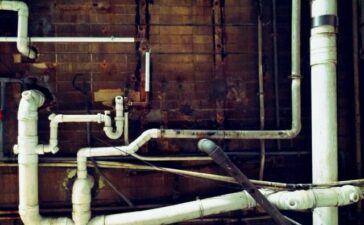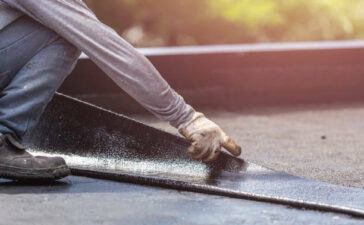If you live in an area with a high level of water hardness, you may have seen that your bath, shower or sink become stained. You might also have noticed that these stains are difficult to clean with regular cleaning products, and you might even be worried that they’re permanent. In this blog, we will explain what hard water stains are, what you can do to prevent them and how you can deal with them if you already have them.
What is hard water?
Hard water contains a high number of minerals like calcium and magnesium. These minerals can build up deposits on the inside of your pipes, shower and kettle, causing limescale. Limescale can mean that your heating is less efficient, costing you more money.
These minerals can also cause stains around key points of use around your home. They are also mineral deposits that build up on your appliances. If your bath, shower, taps or sinks have a chalky white residue, you’re suffering from hard water stains.
The soap scum created by hard water makes the stains worse. When soap scum and hard water are combined, the mineral deposits build up quicker than before. This leaves you with stains that are difficult to clean and unpleasant to look at.
Are hard water stains permanent?
If you do not remove any hard water stains regularly, there is a risk that they will become permanent. This is because the longer they are allowed to build up for, the more difficult they are to remove, and the more cleaning products you will have to use to remove them.
Preventing hard water stains
Unless you move to an area with soft water, the most effective way to prevent hard water stains is with a water softener. These remove the hardness minerals from the water before it enters your home, preventing the build-up of mineral deposits on the pipes and the stains from your bath, sink and shower.
Another way is to stop the water from drying on any surface. This is quite a time-consuming process, especially when you consider how much surface area will need drying quickly after a bath or shower. It’s also very easy to forget, which makes it even more important to know how to remove hard water stains.
Common places to get hard water stains
While hard water stains can form anywhere water is used, they are most common in places like bathrooms and kitchens. This means that they can form around the toilet bowl, on glass shower doors, in the bath, in sinks, on mirrors and on taps.
Cleaning hard water stains
There are a variety of different methods to clean hard water stains, and some of them may be easier for you than others. However, it’s important to be safe when using these cleaning chemicals, so you should always wear rubber gloves and be careful not to spill any on yourself.
Vinegar
Adding vinegar and water to a spray bottle to make a cleaning solution and then spraying it onto a surface like the door of a shower is a great way to start removing hard water stains. It’s important, however, to leave the vinegar on the surface for around 30 minutes. If the vinegar solution evaporates, spray some more onto the surface. It doesn’t matter which type of vinegar you use, whether it’s white vinegar, apple cider vinegar or even cleaning vinegar.
Baking Soda
Another cleaning solution involves mixing baking soda and water to form a paste. You can then apply this paste to an affected area, such as a tile that has water spotting stains. Leave the paste to work on the stain for a few minutes and then scrub at it gently with a bristled brush such as a toothbrush. This should leave your tiles, grout and other areas looking brand new.
Fluoride toothpaste
Using some fluoride toothpaste to remove stains from small metal fixtures and taps. Scrubbing at stains with an old toothbrush and some toothpaste means they will quickly look brand new and is an easy job to keep up with.
Summary
Hard water stains can leave your home looking less than pristine, so it’s crucial that you have the right stain removal methods. Vinegar is the best way of dealing with hard water stains, although it’s important to take the necessary safety precautions when cleaning with vinegar. Other options include baking soda, mixed with water to create a paste or fluoride toothpaste for small metal fixtures.
However, it’s important to clean regularly if you live in a hard water area and to prevent hard water stains it is best to try and keep surfaces as dry as possible. The only alternative would be to install a water softener, which will also improve the efficiency of your heating system.
Author bio: Rachel Gowland works at digital marketing agency, Tillison Consulting. She’s a passionate gamer and avid reader who loves to travel, using her knowledge of foreign languages to connect with people around the world.






